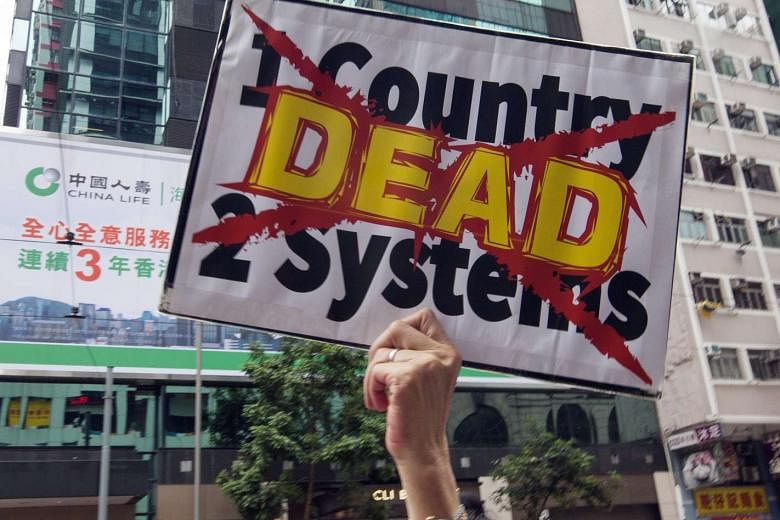Yiu Chi-shing
China Daily/Asia News Network
Hong Kong has made tremendous gains in social and economic development with its capitalist system and people's lifestyles remaining unchanged since the handover in 1997.
This demonstrates that the "One Country, Two Systems" policy has been very effective in maintaining Hong Kong's stability and prosperity.
Ever since Hong Kong's return to the motherland, with the strong support of the central government, the Special Administrative Region (SAR) has managed to strengthen its status as an international finance, trade and shipping center; it also has been continuously recognised as the freest economy around the globe.
The Annual World Competitiveness Yearbook of 2016 published by the Swiss-based International Institute for Management Development (IMD) ranks Hong Kong first among 61 global economies.
Hong Kong's GDP increased from HK$1.37 trillion (S$238 billion) in 1997 to HK$2.39 trillion in 2015, and its annual budget surplus has repeatedly hit a record high.
The city is expected to record another annual budget surplus of HK$11 billion for fiscal year 2016-17.
This is despite the fact that growth in the local economy is likely to slow down in the coming years amid rising uncertainty in the global economy.
These healthy economic conditions - including a stable fiscal situation and nearly full employment, with an unemployment rate at a low of 3.3 per cent to 3.4 per cent - clearly show the economic prowess Hong Kong has acquired over the past 19 years.
Since Hong Kong's handover, the central government has promulgated various policies to support its development. Their positive effects on Hong Kong's economy are plain to see.
From the Asian financial crisis to the global financial tsunami brought about by the US subprime crisis, from the avian flu outbreaks to the Sars crisis, each time Hong Kong was challenged, the central government put forward concrete policies to help it weather the storm.
The central government introduced the Individual Visit Scheme, allowing mainland residents to visit Hong Kong on an individual basis; it signed CEPA (Closer Economic Partnership Agreement - a free trade agreement between China and Hong Kong) and its supplement agreements with the SAR.
This benefited many of the city's business sectors; it also supported Hong Kong's efforts to develop itself as an RMB offshore hub.
Beijing also facilitated establishment of the Shanghai-Hong Kong Stock Connect, encouraged major mainland companies to list in Hong Kong's stock markets, and promoted Guangdong and Hong Kong's cooperation and Pan-Pearl River Delta economic cooperation.
The central government has repeatedly demonstrated that it upholds the "One Country, Two Systems" policy and cares for the well-being of Hong Kong people. Our motherland has been the strongest prop in our development.
Currently, the Chinese mainland is the second-largest economy in the world and is expected to maintain this position with medium to high levels of economic growth in the future.
China is implementing its 13th Five-Year Plan (2016-20) and promoting the Belt and Road strategy. This will generate lots of opportunities for Hong Kong. Hong Kong for sure will gain huge economic benefits if we can secure a head start in these initiatives.
Looking back at the past 19 years, Hong Kong has experienced ups and downs. The recent attempts to effect electoral reforms for the purpose of implementing universal suffrage have sparked controversies in society. The illegal "Occupy Central" movement orchestrated by the opposition camp, the riots initiated by radical "localists" in Mong Kok, and separatism advocacy have cast a shadow over the economy, threatening people's livelihoods and the rule of law - one of Hong Kong's core values.
The city's deep-seated social problems have manifested gradually during these events.
Confronted with these challenges, Hong Kong needs to revisit the original intention of ''One Country, Two Systems'' and realise the need to focus on economic development, as suggested by Zhang Dejiang, chairman of the Standing Committee of the National People's Congress, at a welcome banquet in his honour during his inspection trip to the SAR last month.
He mentioned that when late State leader Deng Xiaoping first proposed the "One Country, Two Systems" concept as a way to resolve the historical issues related to Hong Kong, what he wanted was to resume the sovereignty over Hong Kong while retaining the city's characteristics and advantages as much as possible so as to maintain its long-term prosperity and stability.
The experiences of the past 19 years have demonstrated the vitality of "One Country, Two Systems".
Hong Kong people should have unswerving confidence in the policy, and brave all difficulties and challenges to build a brighter future.
The author is executive chairman of Hong Kong Association for Promotion of Peaceful Reunification of China.

